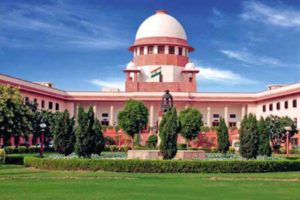Source: www.sci.gov.in
The Supreme Court of India’s constitutional bench comprising Hon’ble CJI Dipak Misra, Hon’ble A.K. Sikri and Hon’ble A.M. Khanwilkar, JJ. have pronounced a detailed judgment[1] in the matter of Aadhaar. By majority judgment, it has been held that:
- “The requirement under Aadhaar Act to give one’s demographic and biometric information does not violate fundamental right of privacy.
- The provisions of Aadhaar Act requiring demographic and biometric information from a resident for Aadhaar Number pass three¬fold test as laid down in Puttaswamy case, hence cannot be said to be unconstitutional.
- Collection of data, its storage and use does not violate fundamental Right of Privacy.
- Aadhaar Act does not create an architecture for pervasive surveillance.
- Aadhaar Act and Regulations provides protection and safety of the data received from individuals.
- Section 7 of the Aadhaar is constitutional. The provision does not deserve to be struck down on account of denial in some cases of right to claim on account of failure of authentication.
- The State while enlivening right to food, right to shelter etc. envisaged under Article 21 cannot encroach upon the right of privacy of beneficiaries nor can former be given precedence over the latter.
- Provisions of Section 29 is constitutional and does not deserves to be struck down.
- Section 33 cannot be said to be unconstitutional as it provides for the use of Aadhaar data base for police investigation nor it can be said to violate protection granted under Article 20(3).
- Section 47 of the Aadhaar Act cannot be held to be unconstitutional on the ground that it does not allow an individual who finds that there is a violation of Aadhaar Act to initiate any criminal process.
- Section 57, to the extent, which permits use of Aadhaar by the State or any body corporate or person, in pursuant to any contract to this effect is unconstitutional and void. Thus, the last phrase in main provision of Section 57, i.e. “or any contract to this effect” is struck down.
- Section 59 has validated all actions taken by the Central Government under the notifications dated 28.01.2009 and 12.09.2009 and all actions shall be deemed to have been taken under the Aadhaar Act.
- Parental consent for providing biometric information under Regulation 3 & demographic information under Regulation 4 has to be read for enrolment of children between 5 to 18 years to uphold the constitutionality of Regulations 3 & 4 of Aadhaar (Enrolment and Update) Regulations, 2016.
- Rule 9 as amended by PMLA (Second Amendment) Rules, 2017 is not unconstitutional and does not violate Articles 14, 19(1)(g), 21 & 300A of the Constitution and Sections 3, 7 & 51 of the Aadhaar Act. Further Rule 9 as amended is not ultra vires to PMLA Act, 2002
- Circular dated 23.03.2017 being unconstitutional is set aside.
- Aadhaar Act has been rightly passed as Money Bill. The decision of Speaker certifying the Aadhaar Bill, 2016 as Money Bill is not immuned from Judicial Review.
- Section 139¬AA does not breach fundamental Right of Privacy as per Privacy Judgment in Puttaswamy case.
- The Aadhaar Act does not violate the interim orders passed in Writ Petition (C) No. 494 of 2012 and other Writ Petitions.”
However, Hon’ble D.Y. Chandrachud and Hon’ble Ashok Bhushan, JJ. have given a separate judgment dissenting on a few points.
[1]Supreme Court judgment in Writ Petition (Civil) No. 494 OF 2012 and connected matters delivered on September 26, 2018.


